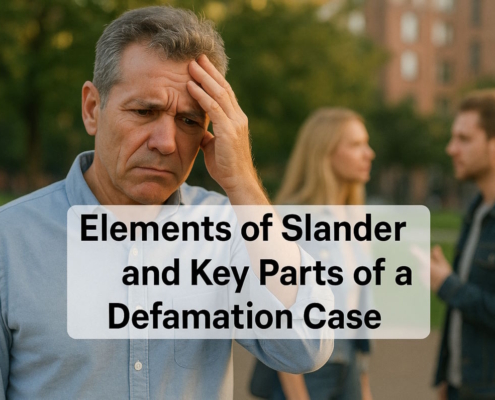Can you sue someone for emotional distress?
If someone’s outrageous behavior causes you emotional distress, and they did it intentionally or recklessly, you can sue for intentional infliction of emotional distress in California.
If your lawsuit is successful, you may be able to collect both punitive damages.
How to sue for emotional distress?
In California, intending to cause mental distress requires proof of the following:
You endured substantial mental anguish because of the defendant’s heinous actions, which were either careless or done with the intent to inflict emotional distress.
What does “serious emotional discomfort” mean in a legal context?
Emotional distress can encompass a wide range of experiences, according to California law:
- Agony
- Distress
- Fear
- Dread
- Uneasiness
- Sadness
- Worry
- Terror
- Embarrassment
- Shame
However, serious mental suffering is required for recovery under California’s “intentional infliction” statute.
“Severe emotional distress” is defined as intense and long-lasting. This kind of pain is so great and persistent that it’s unreasonable to expect a normal person to cope.
What exactly does “outrageous conduct” mean?
Behavior that goes beyond mere rudeness, indignity, discomfort, or hurt feelings is considered outrageous. An act is considered outrageous if it is perceived by a reasonable person as being indecent.
To determine whether the defendant’s actions were outrageous, it is necessary to consider the following factors:
In the event that the defendant misused his or her authority over you, either because of a formal position in the organization or because of a personal connection
To what extent the offender was aware of your susceptibility to emotional discomfort, and
Whether or not the offender was aware that their actions could cause mental distress.
What does “reckless disregard” mean?
A defendant is considered to be acting recklessly under California’s legislation regarding intentional inflicting of emotional distress when:
- The offender is aware that their actions are likely to cause emotional distress, or
- The defendant appears to be completely unconcerned with the potential consequences of their actions.
- The existence of any bad or malevolent intent on the part of the defendant is irrelevant. Their outrageous behavior, without regard for the potential repercussions, is sufficient.
Is a bodily injury necessary?
It is not necessary to provide evidence of physical harm in order to seek compensation for extreme mental anguish.
Emotional distress damages are typically compensated for alongside significant medical costs, lost wages, diminished earning ability, and other forms of compensatory damages.
Is punitive damage recovery possible?
Yes. In California, incidents involving willful or careless misconduct might result in punitive damages.
It is common practice to impose punitive damages in circumstances involving intentional infliction since such cases typically involve “outrageous” behavior.
Examples of intentional emotional distress
Among the many common types of situations involving the deliberate inflicting of emotional distress are:
- Violent crime involving sexual assault or abuse
- Drunk driving that results in harm or death
- Battery and assault resulting in serious physical harm
- Willfully producing or distributing a product with a very high potential for harm
- Overuse of force or retaliation against an individual who has reported wrongdoing






























